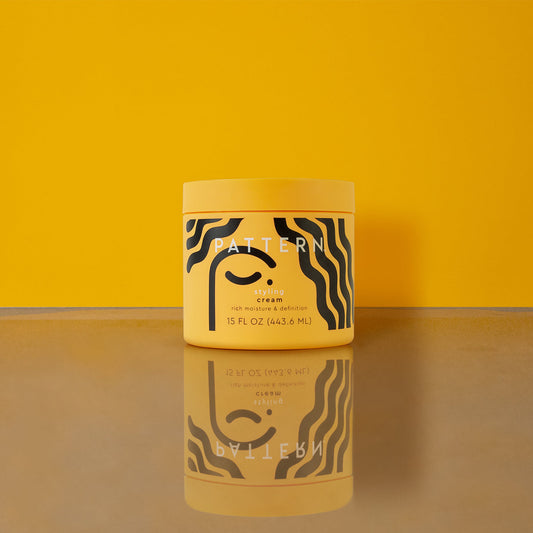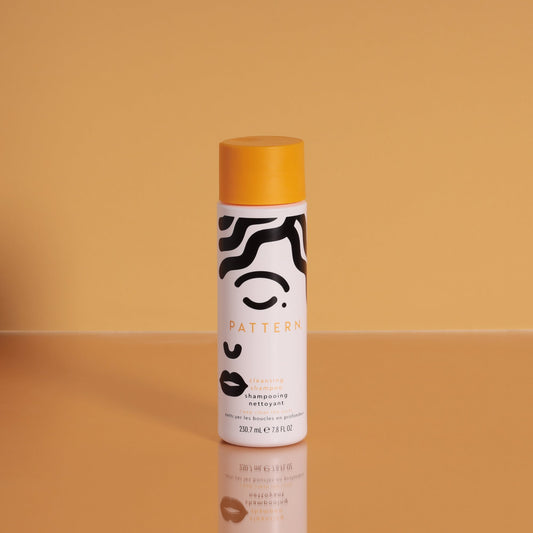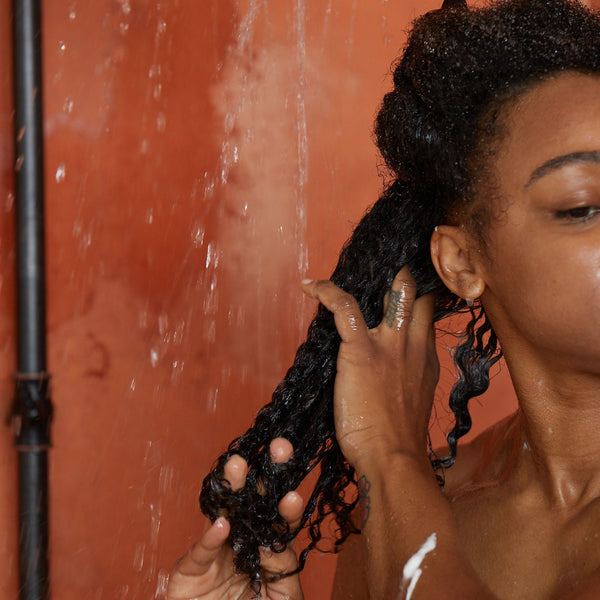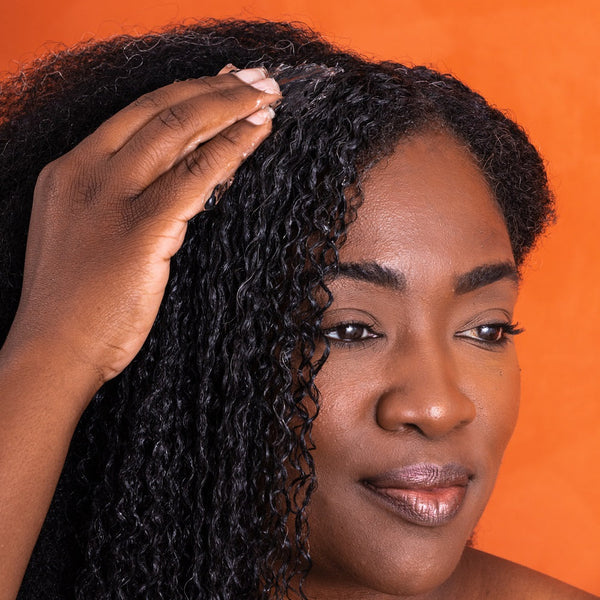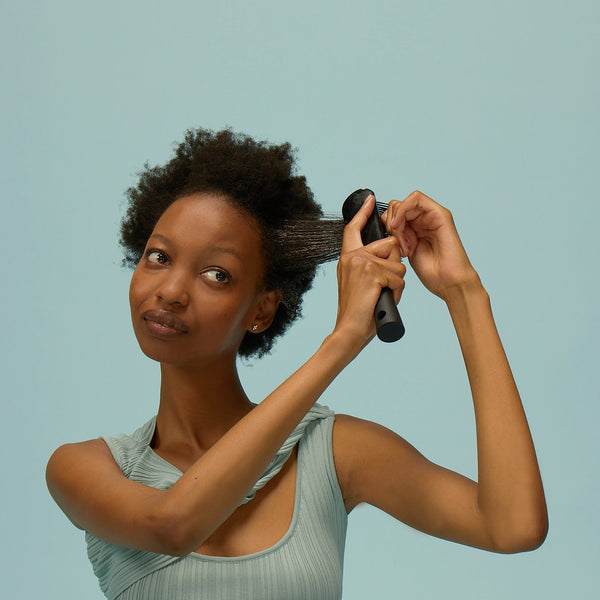By Amy Elisa Jackson
It’s always protective style season. Braids and twists are a go-to for easy, travel-friendly summer hair. Plus, winter months bring a chill that only moisture and protective styles like Faux Locs or Cornrows can beat back. Protective hairstyles are also a great way for those with any curly hair type to allow their curls to grow and take a break from the tension and wear that can come from regular styling. But what’s the best style for you and what’s the best way to care for your protective styles? Let’s get into the basics of protective styling for curls, coils and tight textures.
Do Protective Styles Help Hair Grow?
Protective styles can support hair growth by reducing the amount of daily wear and tear on your hair from manipulation. This in turn reduces breakage and allows hair to grow healthy and strong. Protective styles for natural hair can also protect your hair from environmental stressors such as sun, heat or cold. This is why protective styles can be very popular during the summer or winter.
What is the Best Protective Style for Natural Hair?
Protective styles are a personal choice that may be determined based on your individual style, hair length, your lifestyle, or your hair’s needs. You may prefer to use your natural hair exclusively as is, or you may opt to include some extensions. The best protective style is the one that is best for you.
Bantu Knots
Bantu knots have their roots with the Zulu people of Southern Africa. For a Bantu knot, the hair is sectioned, twisted and wrapped upon itself into “knot-like” spirals or buns. This popular hairstyle can be completed with some luscious curly hair cream, Edge Control and Edge Brush for a polished finish.
Faux Locs
Faux locs are a temporary hairstyle designed to look like real locs. Faux locs can be created on hair as short as 2 inches. As opposed to braiding hair, which typically looks best when fresh, this style often looks better and more natural the longer you wear them. You may have also heard of goddess locs. Goddess locs are similar to faux locs except they have curly ends.
There are two methods to creating faux locs. The first method involves braiding the natural hair then wrapping extensions around the braids to create the loc-like look. This technique can be helpful in aiding moisture retention as wrapping the extensions around the hair can help seal in the hair’s natural moisture. For this reason, we encourage you to start with Curl Cleansing Shampoo, Deep Conditioner and Jojoba Scalp Oil so that your hair is clean and hydrated underneath any extensions. The second method involves braiding the hair then crocheting the locs into the braids. This approach is best for those using synthetic hair.
Here are a few pro tips for those considering trying faux locs:
- If your locs feel stiff on the day of install, try lightly dipping them in hot water for a few seconds to loosen them.
- Frizz is our friend and some frizz on faux locs makes the style appear beautifully natural. However, on faux locs you want to manage the frizz a bit as you may be dealing with synthetic hair. Without proper frizz maintenance, the faux hair may become difficult to manage or deinstall. We recommend moisturizing with our Hydrating Mist and lightly trimming away a bit of the frizz to your preference.
- Caring for faux locs includes cleansing, but instead of drenching their hair, mix our Hydration Shampoo and Water in our Mist Spray Bottle and spray the scalp. Lightly massage with fingers and thoroughly respray with clean water. You don’t want to soak the hair but you do want to eliminate any remaining shampoo and conditioner for natural hair. The process may be a bit messy but it will help the style last longer as soaked faux locs may become too loose.
- When de-installing faux locs, it may be best to seek the assistance of a professional or at least a friend to ensure that you don’t accidentally cut your own hair. Keep in mind that your own braids are beneath the extra hair.
Braids
Braids are one of the most popular protective styles as they are extremely versatile and last a long time. One can experiment with a wide variety of updo braids that may include hair extensions or a natural hairstyle such as Ghana Braids, Cornrows, Fulani Braids, Box Braids, or Flat Twists. This style may be great if you work out frequently. The tightness of the braids helps to maintain the style even during co-washing out sweat.
Here are a few tips on caring for braids:
- Similar to faux locs, you want to focus on shampooing just the scalp; however braids can withstand a traditional shampoo.
- When shampooing, massage vertically between the braids to keep the hair laying in the direction of the hair. Avoid creating unnecessary friction.
- Because braids can trap water, it’s important to both rinse and dry thoroughly as you want to avoid allowing any mildew or fungus to grow in the hair. You may choose to only complete this wash process once or twice during the entire time you wear this protective style. For more information, read our blog post about how to plop your hair properly.
- Moisturize with our Jojoba Oil Blend or Argan Oil Blend to keep your natural hair underneath moisturized.
Buns
A top knot, messy loose bun or chic low bun are sleek and simple protective styles that can prevent your hair from experiencing too much wear and tear while transitioning hair. If wearing repeatedly, we encourage being very selective about the gel you use to slick back your hair. Use a Strong Hold Gel with humectants such as Sea Moss or Aloe and opt for an Edge Control with Castor Oil. Moisturizing and hydrating natural hair care products help ensure that your hair remains healthy as some gels may dry out healthy hair or block moisture when used repeatedly. For those who will repeatedly wear a bun, it is recommended to pull the hair loosely into a Satin Scrunchie instead of a traditional ponytail holder. The satin will protect ends. Loosely holding the bun instead of tight styles will protect the hair and scalp. While a traditional ponytail holder is great for a special occasion, if you plan on wearing your bun for a few days, you may want a hair accessory that will reduce the probability of tangles or knots. Also, keep in mind to protect the outer layers of your high bun that are still exposed while you sleep. Wrap your hair in a satin scarf or sleep on a silk pillowcase.
Twists
Twists are created by twisting two small sections of hair around one another from root to tip. Twists can be either very thick or thin. This protective hairstyle can be left in for days or weeks. It is easy to wash hair while in loose twists once or twice. They are easy to take down making them a favorite of protective style lovers.
Senegalese twists, sometimes referred to as rope twists, can be created on natural hair or using extensions according to your preference. They can be thick or thin depending on your style and can easily protect your hair from the elements. Marley Twists and Havana Twists can incorporate synthetic hair or extension hair to create the look. Flat twists lay flatly against the scalp in a cornrow-like manner. This style can also create a beautiful corkscrew-like curl in the form of a twist out when unraveled.
Afros and Puffs
While hair is still left out in these styles, they are still technically considered protective styles as they lift the hair off of clothing and jewelry which may cause friction. However, it is cautioned that tighter textures pay careful attention to how they style their afros and puffs. Loose tight hair texture has a tendency to curl on themselves making them vulnerable to knots and tangles. Using a heavier Styling Cream or Curl Gel to smooth the cuticle and provide a little weight can help prevent knots. Also, deep conditioning hair with a restorative, hydrating formula like our Intensive Conditioner or Heavy Conditioner can help keep hair supple and soft making it less prone to unpliable tangles and snagging.
What is the Longest-Lasting Protective Style?
If you’re looking for a low-maintenance protective style that will last you for a while, natural hair box braids are an excellent option. Knotless box braids can last up to two or three months in the braided style. The tightness of the braid itself allows for more frequent washing without the hair expanding and moving. For this reason, the style lasts longer. Box braids are also excellent for reducing knots and tangles due to the tight and tidy braiding pattern that prevents a lot of movement amongst the strands.
What is the Most Protective Hairstyle?
The aforementioned hairstyles are all highly protective. The key is to not allow the hairstyle itself to become the source of stress on your strands. Protective hairstyles such as braids or faux locs may require some tension to create and can have risks of their own if worn frequently without breaks. Let’s talk about how to protect your hair while wearing protective styles.
It’s important to always protect your hair. A protective hairstyle can protect your hair from repeated friction, wear and tear. However, you still want to make sure that your hair is healthy in those styles. Washing your hair regularly with a Clarifying Shampoo and using a hydrating conditioner can ensure that your hair stays moisturized. Treating braids and twists with oils such as our Argan Oil Blend or Jojoba Oil Blend can help protective styles retain moisture as well. A daily refresher such as our Hydrating Mist can revive hair and rehydrate hair between wash days.
Avoid wearing your hair in the same style for 6-7 months. When you love a style it can be tempting to take a two-day break and then repeat it immediately. However, switching up your style gives different parts of your hair a chance to breathe and grow. For example, if the style you love requires tension around the hairline, you may want to alternate with a style that does not, so that the follicles and strands around your hairline have a break from those stressors. This can prevent unnecessary breakage.
Take care of your scalp as well. Tight protective styles can create tension on the scalp, and when worn repeatedly, can cause traction alopecia, a form of hair loss. Be sure to let your scalp relax from time to time, avoid wearing styles that are too tight, and pamper your scalp with oils like our Scalp Serum which contains Lavender, Peppermint and Rosemary Oil.
What’s your favorite protective style for the season? How do you normally take care of your protective styles?
Sources:
- BGLG Marketplace. 3 Protective Styles for Maximum Length Retention of Type 4 Hair. Accessed July 11, 2021. https://bglh-marketplace.com/2013/07/3-protective-style-regimens-for-maximum-length-retention-of-type-4-hair/#:~:text=When%20it%20comes%20to%20length,a%20longer%20duration%20than%20twists.
- Byrdie. The Complete Guide to Two-Strand Twist Hairstyles. Accessed July 11, 2021. https://www.byrdie.com/all-about-twists-or-two-strand-twists-hairstyles-400274
- Black Hair Information. Shrunken Afro, A Protective Style? Accessed July 11, 2021. https://blackhairinformation.com/by-type/natural-hair/shrunken-afro-a-protective-style/
- Naturally Curly. Are buns an effective protective style? And are hair doughnuts safe? Accessed July 11, 2021. https://www.naturallycurly.com/questions/hair-and-health/are-buns-an-effective-protective-style-and-are-hair-doughnuts-safe-1067#:~:text=buns%20can%20be%20truly%20protective,too%20tightly%20on%20your%20roots
- Byrdie. A Step-by-Step Guide to Creating Bantu Knots. Accessed July 11, 2021. https://www.byrdie.com/bantu-knots-5075639#:~:text=What%20Are%20Bantu%20Knots%3F,to%20form%20a%20spiraled%20knot
- Glamour. 31 Cool Protective Hairstyles You’ll Want to Try This Year. Accessed July 11, 2021. https://www.glamour.com/gallery/cute-protective-styles
- This is Essential. Protective Styling; Everything You Need To Know About Faux Locs. Accessed July 11, 2021. https://www.thisisess.com/protective-styling-everything-you-need-to-know-about-faux-locs/#:~:text=What%20are%20Faux%20Locs%3F,the%20base%20for%20the%20dread.
- Loccessories. Everything You Need To Know About Faux Locs: Newbie Questions Answered. Accessed July 11, 2021. https://loccessories.com/everything-you-needed-to-know-about-faux-locs/#:~:text=Yes.,as%20two%20inches%20of%20hair
- Neroli salon & spa. How to care for your braids. Accessed July 11, 2021. https://nerolisalonspa.com/2020/08/24/how-to-care-for-your-braids/

